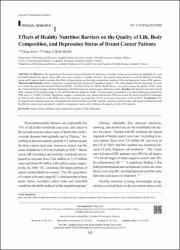Effects of healthy nutrition barriers on the quality of life, body composition, and depression status of breast cancer patients
Künye
BAŞ, D., & ÇAKIR BİÇER, N. (2023). Effects of Healthy Nutrition Barriers on the Quality of Life, Body Composition, and Depression Status of Breast Cancer Patients. Journal of Oncological Sciences, 9(3), 142–151. https://doi.org/10.37047/jos.2023-97828Özet
Objective: The gap between the desire to promote health and adherence to healthy eating recommendations highlights the need
to identify barriers for breast cancer (BC) survivors to achieve a healthy lifestyle. The present study aimed to reveal the barriers to healthy
eating in BC patients and to evaluate the effects of these barriers on the body composition, quality of life, and depression status of BC patients.
Material and Methods: Body composition was determined by bioelectric impedance analysis. The scale adapted from the literature was used
to evaluate the perceived nutritional barriers (PNBs). The Short Form-36 (SF36) Health Survey was used to assess the quality of life, while
the Center for Epidemiologic Studies Depression (CES-D) Scale was used to assess depression status. Results: The patients were interviewed
after a median of 28 months (range: 6-192 months) after the diagnosis of BC. A weak negative correlation was observed between age and the
PNB score (r=-0.209; p=0.020). Significant negative correlations were found between the PNB scores and the scores of all SF36 subscales
(p<0.05 for all). Moreover, as the PNB scores of the patients increased, the CES-D scores also increased (r=0.25; p<0.01). Conclusion: Following the active treatment process, determining the nutritional barriers of BC patients, creating a nutrition plan, and regular monitoring could
be effective steps to prevent obesity, which is a prognostic factor, and to improve the quality of life of BC patients.

















